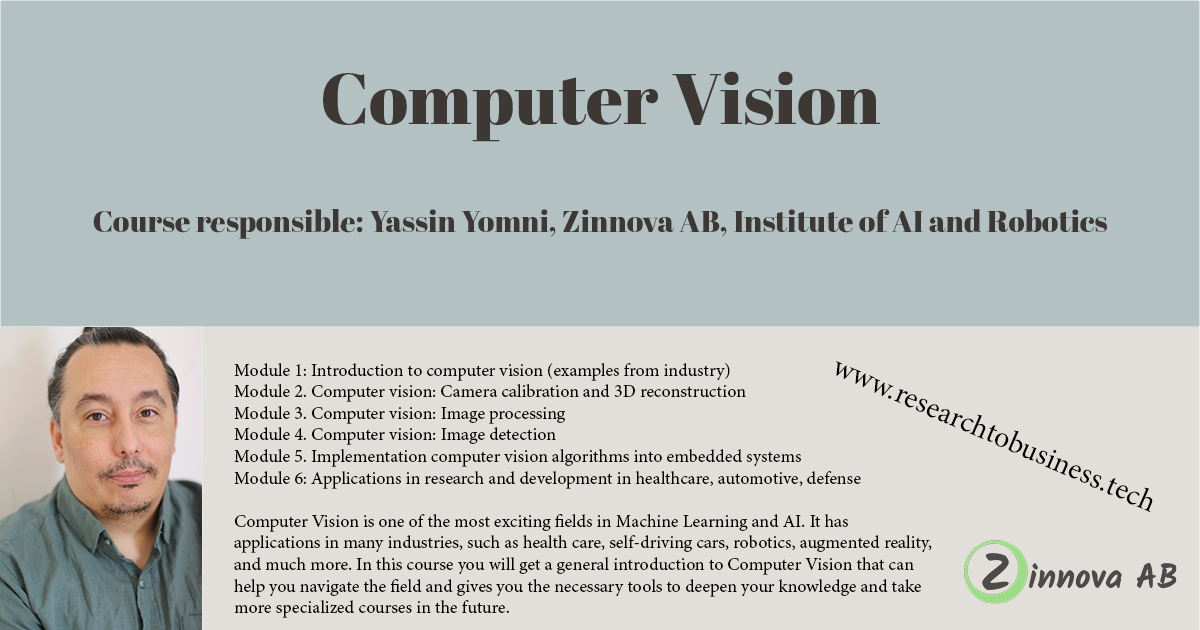Computer Vision
Course responsible: Yassin Yomni, Zinnova AB, Institute of AI and Robotics
Module 1: Introduction to computer vision (examples from industry)
Module 2. Computer vision: Camera calibration and 3D reconstruction
Module 3. Computer vision: Image processing
Module 4. Computer vision: Image detection
Module 5. Implementation computer vision algorithms into embedded systems
Module 6: Applications in research and development in healthcare, automotive, defense
Computer Vision is one of the most exciting fields in Machine Learning and AI. It has applications in many industries, such as health care, self-driving cars, robotics, augmented reality, and much more. In this course you will get a general introduction to Computer Vision that can help you navigate the field and gives you the necessary tools to deepen your knowledge and take more specialized courses in the future. We will go in depth in different parts of Computer Vision such as camera calibration, 3D reconstruction, Image segmentation, feature extraction and classification using among others AI/ML. We’ll also discuss and give concrete examples of computer vision applications in the Automotive industry and in research areas such as health care and disease diagnostics.
You should have basic understanding in Linear Algebra
ABOUT

Dr. Yassin Jomni is a researcher, scientist, serial entrepreneur, engineer and book writer with an extensive career working in a wide number of fields ranging from district heating, flow metering, health tech, telecom, automotive, defense and aerospace industries. Dr. Jomni has also founded three startups and co-owned one.
Dr. Jomni earned his Engineering License and Ph. D. in Industrial Electronics from Luleå University of Technology in 2006. His thesis was on Improving Heat measurement Accuracy in District Heating Substations and his work involved heat transfer and propagation modelling in heat exchangers as well as developing a set of novel algorithms aimed to improve heat energy measurement accuracy in district heating substations under dynamic load. He was also involved in a joint project between Luleå University of Technology and Lund University were a model of a District Heating Substation and a House were developed to simulate heat transfer, control and measurement performances under different loads.
Dr. Jomni left academia in 2007 and enrolled since then in different roles in Algorithms, Computer Vision, Embedded Systems Design and Engineering as well as Embedded Systems safety and cyber security in a wide number of industries ranging from flow metering, health tech, telecom, automotive, defense and aerospace. Inspired by his Ph. D. thesis but aimed for the general audience, he published a book in 2010 called “Improving Heat Energy Measurement in Houses and Buildings: Problems and Solutions” (ISBN: 3838312872).
Dr. Jomni started his entrepreneurial journey already as a Ph. D. candidate at Luleå University of Technology where his first start-up, at the dawn of the IoT-era, implemented the measurement algorithms from his research into internet connected heat meter prototypes. He later Co-owned a start-up that developed a the only smart watch in the world of its time with a local encrypted cloud. Dr. Jomni started Z Dev AB later in 2016, a consultancy company specializing in Algorithm, Computer Vision, Embedded Systems, Safety and Cyber Security Engineering services for real-time and resource critical embedded applications.
Dr. Jomni resumed his research career during the 2019-2020 pandemics and started developing different Computer Vision Algorithms for Plasmodium (Malaria parasite) detection in digital images of both thick and thin Gimsa stained blood smears. He founded Zinnova AB, his latest start-up, to implement his Malaria Diagnosis algorithms in an offline and resource efficient Android mobile app aimed to be used in areas lacking proper infrastructure such as remote African villages. His start-up was one of the 60 semi-finalists from 1800 startups at the 2021 MIT Solve’s Global Challenges contest.
Dr. Jomni’s research interests are Artificial Intelligence (AI) and Computer Vision (CV) applications in the diagnosis of neglected tropical diseases such as Malaria, Visceral Leishmaniasis and Trypanosoma. His research interests also include the applications of Fluorescence Microscopy (FM), Raman Spectroscopy (RS), Near-Infrared Spectroscopy (NIRS) and Mid-Infrared Spectroscopy (MIRS) in neglected tropical diseases diagnosis.
Dr Jomni is strongly driven by the societal usefulness from research and therefore always aims to implement his findings in affordable and easy to use tools for neglected tropical disease diagnosis as he strongly believes there is no better reward than making the difference in somebody’s life.